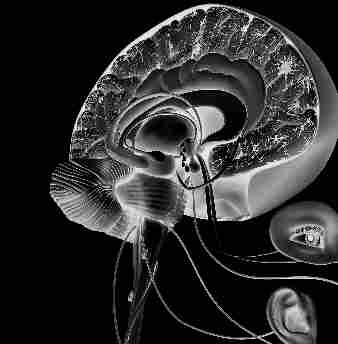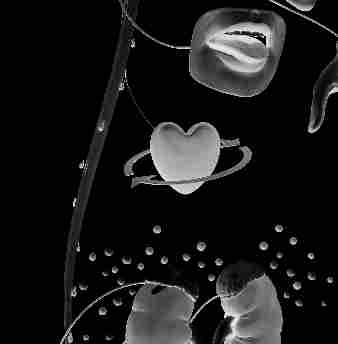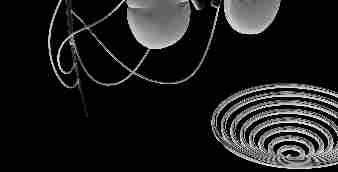Switch on Your Brain: The Key to Peak Happiness, Thinking, and Health (5 page)
Read Switch on Your Brain: The Key to Peak Happiness, Thinking, and Health Online
Authors: Dr. Caroline Leaf
Tags: #Health; Fitness & Dieting, #Christian Living, #Mental Health, #Christian Books & Bibles

own unique perception, based on these implanted thoughts
that form our point of view, on our way to verbalization or
action we perform. So in simple terms, what we say and do
is based on what we have already built into our minds. We
evaluate this information and make our choices based on this
information, then we choose to build a new thought, and this
is what drives what we say or do.
This brain activity, seen in brain imaging, is not the result
of machine-like activity; it is simply the build-up to the mo-
ment of consciousness. It is the activity of a network of neural
circuits that begin to prepare for an upcoming decision long
before it enters our awareness. It is the intellectualizing that is
happening in the nonconscious mind. In other words, “As he
thinks in his heart, so is he” (Prov. 23:7). We are not driven by
forces beyond our conscious control. We are accountable for
every thought and decision we make.4 We are highly intelligent
beings with free will, and we are responsible for our choices.
Some forward-thinking researchers have found that when
people doubt free will, they become more dishonest. It is
almost as though denying free will provides the ultimate ex-
cuse to behave however people want without accountability
for their actions.5
42
_Leaf_SwitchOnBrain_LS_mw.indd 42
5/16/13 1:33 PM
Choice and Your Multiple-Perspective Advantage
Other researchers found that believing in free will guides
people’s choices toward being more moral and better perform-
ers. They go so far as to say that the more researchers investigate
free will, the more reasons there are to believe in it, and that
to an extent those who believe otherwise delude themselves.
Ecclesiastes 7:29 (NLT) says it like this: “God created
people to be virtuous, but they have each turned to follow
their own downward path.” A standard definition of free will
is a “set of capacities for imagining future courses of action,
deliberating about one’s reason for choosing them, planning
one’s actions in light of this deliberation and controlling
actions in the face of competing desires.”6 This, I believe, is
how we choose to follow either God’s path or Satan’s path.
Science is proving free will right down to the genetic level.
Let’s take a look at some of the evidence.
Choice Has Mental Real Estate
Choice has mental “real estate” around the front of the brain. It
includes many circuits that start at the basal forebrain (between
your eyebrows) and extend back across the frontal lobe, which
is capable of an impressive array of functions and is connected
to all other parts of the brain. It is also where connections from
all the other parts of the brain converge. Specific circuits go to
structures like the insula, corpus callosum, anterior and pos-
terior central gyrus, basal ganglia, precuneus, and subgenuel
region of the brain.7 This arrangement enables the frontal lobe
to integrate and manage activities in the other parts of the brain.
We Can Observe Our Own Thoughts
One of the most exciting features of frontal lobes is how they
enable us in a sense to stand outside ourselves and observe
43
_Leaf_SwitchOnBrain_LS_mw.indd 43
5/16/13 1:33 PM




Inside the Brain
fornix
corpus callosum
caudate
septum pelucidum
(part of basal ganglia)
dura mater
stria terminalis
ACG
hypothalamus
PFC
thalamus
insula & claustrum
(deep to lateral sulcus)
pineal gland
mamillary body
amygdala
basal forebrain
(contains septal nuclei)
hippocampus
pituitary gland
entorhinal cortex
(surrounds
CRF
hippocampus)
sight
cerebellum
ACTH
midbrain
nerves
pons
medulla
hear
smell
reticular activating system
(inside brain stem)
taste
touch
heart
spinal cord
adrenaline
adrenal glands
corticosteroids
kidneys
emotional
black hole
spinal nerves
_Leaf_SwitchOnBrain_LS_mw.indd 44
5/16/13 1:33 PM
Choice and Your Multiple-Perspective Advantage
our own thinking. We can observe our thoughts and actions
and make decisions about them. Suddenly, biblical principles
such as “bringing all thoughts into captivity,” “renewing your
mind,” “casting all your cares,” and “being anxious for noth-
ing” become less difficult when we realize God has given us
the equipment to do these things.
When we choose life (Deut. 30:19), the diamond increases
its shine; when we choose anything other than life, the dia-
mond loses its shine. This is a simple analogy of what hap-
pens in the brain. The wrong choices cause brain damage.
The right choices enhance brain function.
Our MPA
We have what I like to call “multiple-perspective advan-
tage”—MPA for short. Our unique, multifaceted nature,
made in God’s image, allows us to see things from many
different angles—like different perspectives. We have the
unique opportunity to assess our thoughts and their im-
pact and choose to connect to the vine that is Christ (John
15:1–5)—to restore growth and prune off the branches of
toxic thinking.
We are directly responsible for what we choose to think
about and dwell on, and we make these decisions in the pri-
vacy of our own thinking. As you think, it is important to
make a distinction between who you truly are—the real,
multifaceted, unique you—and the person you have become
through toxic choices. Fortunately, you can see both and
choose to reconnect with the vine (John 15) and renew your
mind (Rom. 12:2). Your brain will follow the instructions and
choices of your mind and change its landscape accordingly.
Part 2 of this book will help you do just that.
45
_Leaf_SwitchOnBrain_LS_mw.indd 45
5/16/13 1:33 PM




